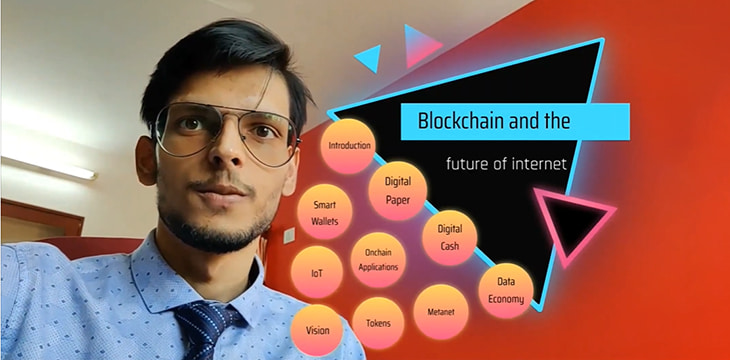Rohan Sharan, the recently appointed Bitcoin Association Ambassador for India and the founder of Timechain Labs, is passionately creating awareness about Bitcoin SV in India—a constantly growing technology hub. Sharan strongly believes in educating the youth, especially college students, about this technology, as his journey in this space commenced during his college days. Sharan learned about Bitcoin after he won one as prize money for a competition in college, which intrigued him to learn about the properties of Bitcoin and smart contracts and how they can solve many common problems in today’s world. His research inspired him to dive deeper and start his own company, Timechain Labs, focusing on onchain application development.
He addressed a myriad of topics during a virtual talk he delivered to Electronics & Communications engineering students at Dr. D.Y. Patil Institute of Technology, Pune. What is blockchain, and how is blockchain a digital ledger? How does it power the new data economy; what are smart wallets? Sharan explained these concepts to the students, later pointing out that the ultimate vision is to have the new internet powered by the blockchain become a fundamental protocol at the HTTP level, hence a massive surge in the number of on-chain applications.
“Bitcoin is an economic system which creates a marketplace for block production. A new block gets added every 10 minutes, so the miners operate in a cooperative competition to produce the next block. Why cooperative? Because each miner requires the other to build on top of their block,” Sharan explained.
He described the proof of work concept, pointing out the misconceptions that cloud this industry—scalability being the most common one. “People generalize that this technology does not scale, but BSV does; it follows the scalable blockchain model. BSV blockchain is based on proof of work, making it the most optimal per-transaction system. It is not only more optimal than the rest of the blockchains but is hyper-efficient,” he stressed.
He said transactions on BSV enterprise blockchain are “super cheap” compared to multiple dollars per transaction on other blockchains. He highlighted the difference between BSV and other blockchains based on parameters such as data privacy, consensus model, tokens, smart contracts, maintenance cost, and data immutability.
“Bitcoin can facilitate value-based internet, aka data economy. Users will be able to own their data, earn from data; and can have a semantic web with onchain p2p interaction,” he said.
After acquainting students with the tidbits of Bitcoin and blockchain, it was time for Sharan to bring the message home. Sharan told students that there are several opportunities for a country like India to benefit from BSV enterprise blockchain, although he particularly mentioned some. The real question here is: What is Satoshi’s vision for India? How can BSV and blockchain help India and billions of Indians?
In many ways: BSV can help tame the menace of corruption that holds back the country’s productivity. BSV can reduce the involvement of middlemen and up productivity, especially in agriculture, where farmers lose most of their revenue to the intermediaries. BSV can help build a reliable and real-time legal system. BSV can help monetize the volume of transactions by taking advantage of the large population size of 1.4 billion to create massive wealth through micropayments at scale.
“I’d like to call Bitcoin’ production-centric’ instead of ‘consumption-centric.’ It will give the power back to individuals, which is with the platform owners right now,” Sharan concluded.
Watch: CoinGeek New York presentation, Increasing Footprints of BSV Blockchain in Middle East & South Asia
Source: Read Full Article
